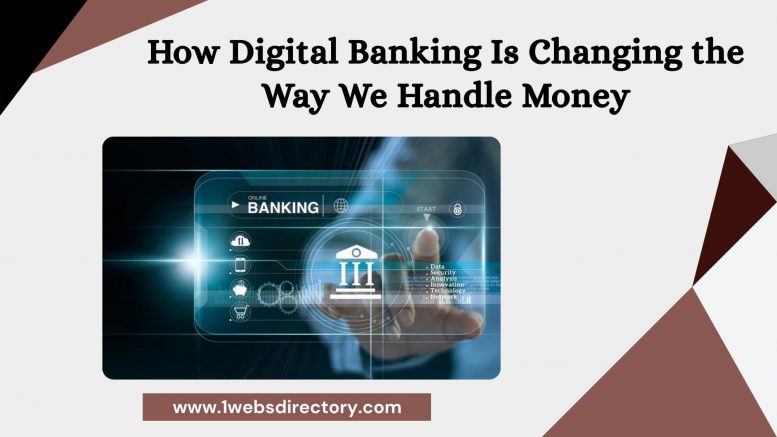In these days’s hastily evolving economic panorama, virtual banking has emerged as one of the maximum transformative forces in the manner human beings manage, spend, and grow their money. What became once limited to long queues in conventional financial institution branches has now shifted into a unbrqoken experience available at our fingertips. From cell fee apps and digital wallets to AI-driven financial recommendation, digital banking is reshaping no longer most effective private finance but also the broader monetary ecosystem.
The Rise of Digital Banking
The concept of digital banking has been around for some time, starting with the creation of ATMs and on-line banking portals within the late twentieth century. However, the actual revolution befell in the remaining decade with the good-sized adoption of smartphones, high-velocity net, and fintech innovation. Banks have transitioned from being mere custodians of money to imparting an atmosphere of offerings designed to improve comfort, accessibility, and monetary literacy.
Today, virtual banking isn’t limited to conventional banks imparting on line services. Fintech startups, neobanks, or even tech giants are entering the economic offerings space, developing greater opposition and innovation than ever earlier than.
Convenience and Accessibility
One of the biggest benefits of virtual banking is its capability to do away with geographical obstacles. People can open money owed, transfer cash, pay payments, or practice for loans without stepping foot into a financial institution department. Features like 24/7 account get admission to, instantaneous notifications, and virtual customer support have made monetary services a way greater convenient.
For people in rural or far off areas, digital banking has introduced financial inclusion. Mobile banking and UPI (Unified Payments Interface) systems, especially in international locations like India, have allowed thousands and thousands of people to participate in the formal monetary system for the first time.
Contactless Payments and Digital Wallets
The COVID-19 pandemic expanded the use of contactless bills and virtual wallets together with Google Pay, Apple Pay, and Paytm. These gears allow users to keep card information securely and make brief, tap-to-pay transactions. This trend is not just about speed; it’s also about safety and hygiene, making physical cash less crucial.
Digital wallets have additionally integrated loyalty programs, investment alternatives, and credit score facilities, in addition blurring the line among conventional banking and monetary technology.
Personalized Financial Management
With the help of artificial intelligence and gadget getting to know, banks can now offer personalized insights to clients. Digital banking apps can analyze spending styles, recommend financial savings dreams, and even provide funding recommendation.
For instance, in case you regularly spend on dining, your banking app may advise setting a monthly restriction or advise cashback offers. Similarly, AI-driven robo-advisors provide low-value investment techniques tailored to man or woman risk profiles, making wealth control reachable to greater humans.
Enhanced Security Measures
As more money moves online, the dangers of fraud and cybercrime additionally increase. To counter this, banks have invested closely in security technologies. Features like biometric authentication, two-issue verification, actual-time fraud detection, and blockchain-based totally transactions have stronger the security of virtual banking.
While cyber threats continue to be a concern, the combination of regulatory frameworks and superior safety gear offers users with more peace of thoughts.
Business and Economic Impact
Digital banking doesn’t just have an effect on individuals it has reshaped how businesses function. Small and medium establishments (SMEs) benefit from virtual payment solutions, on the spot settlements, and on-line mortgage approvals. Cross-border transactions have become quicker and cheaper, encouraging international change.
Moreover, digital banking reduces operational charges for economic establishments, that may then skip at the advantages to clients through lower expenses and higher hobby prices on savings.
Challenges Ahead
Despite its many advantages, digital banking is not without challenges.
- Digital divide: Not all people has gotten admission to to smartphones or reliable net.
- Cybersecurity threats: Hackers hold to conform their techniques.
- Over-reliance on generation: System outages or technical glitches can disrupt offerings.
- Privacy worries: The series of economic data increases questions about how personal data is stored and used.
Addressing these challenges will be crucial for the sustainable growth of digital banking.
The Future of Money Management
The next phase of virtual banking will in all likelihood integrate technology like blockchain, important financial institution digital currencies (CBDCs), and superior AI. Open banking, in which purchasers can securely proportion financial statistics with third-birthday party carriers, is likewise gaining momentum. This will create greater competition, higher merchandise, and extra transparency for clients.
In the long run, digital banking should pass us in the direction of a cashless society, in which economic transactions grow to be quicker, inexpensive, and greater steady. The position of banks will evolve from being transaction processors to financial companions, assisting clients navigate a more complex and interconnected financial global.
Conclusion
Digital banking has redefined how we deal with money. What once required a visit to a bank department can now be finished in seconds on a phone. From advanced comfort and accessibility to superior protection and personalized services, digital banking isn’t just a trend it’s the future of finance.
As era maintains to adapt, so will our courting with cash. Embracing virtual banking these days approach getting ready for a greater linked, efficient, and inclusive financial day after today.
Explore finance-related resources and listings in the Finance Directory at 1WebsDirectory.



Be the first to comment on "How Digital Banking Is Changing the Way We Handle Money"